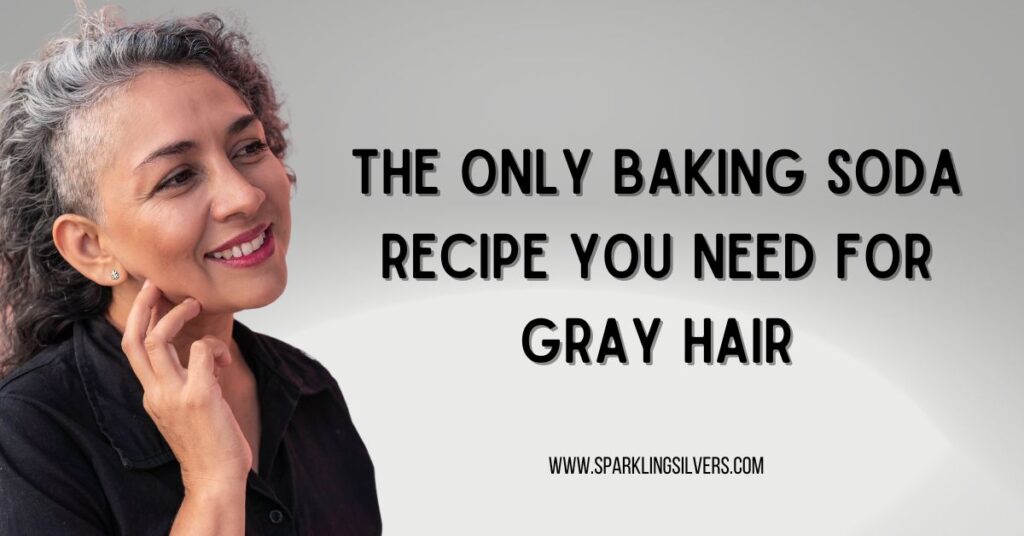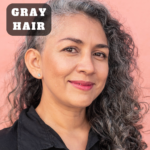Talking about using baking soda on grey hair, the internet is flooded with several DIY recipes, which can be drying and damaging in the long term if the wrong measurements are made.
In this post, I will share how baking soda can be used in a safe way using the scientifically proven method so that it will be least damaging to gray hair and will brighten gray hair removing the yellow by clarifying the scalp and hair strands.
SO let’s start with an introduction to baking soda and how it works on hair and scalp.
Please remember the recipe shared in this post can be helpful in removing yellow from natural grey hair caused by product buildups and mineral deposits from hard water and not brassiness/yellow caused by any damage from using heat on grey hair or sun damage. There is a different post on this topic. Read here.
“This page contains affiliate links. If you click one of the product links, I’ll receive a commission. No additional charges for you!”
Baking soda is a very popular type of salt, packed with several chemical and physical properties that makes it a very strong cleanser.
One of the chemical characteristics of baking soda is that it has an alkaline pH, which has both pros and cons for using it on hair and scalp.
When used on the scalp, it can wash out dirt particles and also natural sebum.
If used as a paste on the scalp, it acts as an exfoliator due to its fine crystal-like texture.
Let us see what a pH scale looks like and what is the safe pH levels for hair.

The sebum produced in our sebaceous glands is acetic, with a pH ranging from 4 to 6, and coats our hair.
The alkaline pH of baking soda is 9.
What does baking soda do for gray hair?
Natural gray hair has no pigment and can grab brassiness due to a variety of external factors like environmental pollutants, minerals in the water, use of certain hair care products, smoking, etc.
These pollutants stay on the surface of gray hair, making it look dull and brassy.
To get rid of these nasties, cleansing and clarification of grey hair is necessary.
- Baking soda acts as a gentle abrasive and helps in removing impurities and residue that contribute to yellowing. It can also help in breaking down mineral deposits from hard water.
- Not only this, its alkaline nature can help neutralize the high pH that often contributes to yellowing in gray hair.
Baking soda to remove yellow from gray hair:
A concentrated amount of baking soda is strong enough to lift up your hair cuticles and weaken the hair’s keratin bonds.
The best way to use baking soda on hair is to dilute it and bring the pH down to a safe level.
Water has a pH of 6-7. The pH falls somewhere in the middle when mixing diluted water and baking soda. Because the pH of the water and baking soda are close, it takes a large amount of water to dilute just a small amount of baking soda.
So what is an ideal ratio of water and baking soda safe for hair use?
The answer is:
8 oz of Distilled Water + 1 Teaspoon Baking Soda
Or, say, 1 cup of distilled water with 1 teaspoon of baking soda.
Mix them up thoroughly and use as a rinse.
Pour the mixture on the scalp and massage gently but thoroughly on the scalp and hair.
Let it sit on your hair for a minute, and then rinse it off.
That’s it!
You can also go for this easy method:
Baking soda and shampoo recipe for gray hair:
Take any regular shampoo of your choice in a bowl with the required amount for your hair.
Take 1 tablespoon of baking soda and half a cup of distilled water and mix well.
Mix this concoction with your shampoo.
Then, shampoo your hair with this mixture and rinse it thoroughly.
That’s it!
Baking soda and apple cider vinegar for grey hair:
Now, the most important thing!
Using baking soda on hair can immediately make hair soft and fluffy because its alkaline pH loosens/opens hair cuticles.
Opened hair cuticles mean rough, dry and tangled hair. It can be drastic for grey hair as it tends to be drier than pigmented hair.
So, how do you close/tighten the cuticles back?
Conditioner!! Yes, don’t ever skip this step after using baking soda on your hair.
Or, if you wish to go with a more natural and trusted way to close the cuticles and bring shine to your silvers, use ACV rinse!
It is also an excellent way to get rid of mineral deposits from hard water.
ACV rinse benefits hair strands due to its acidic pH. It helps tighten or close the cuticle layers of hair.
With a pH of 2, apple cider vinegar is not safe to use on hair because it’s too acidic, so to use it on hair and scalp, it should be neutralised or increased to a pH to a safe pH level for hair.
If you want to use apple cider vinegar a few times a year to revive your hair, increase its pH to 3.
This can be achieved by mixing:
7 oz of Distilled Water + 1 oz of ACV
Or, say, 1/8 cup of ACV + 1.2 cup of distilled water.
Rinse your hair with this rinse and see the magic.
If you wish to use ACV more often, it’s best to increase the pH to about 4 by adding more water.
To achieve a pH of 4, mix one teaspoon of ACV with 8 ounces of distilled water.
Another issue with baking soda is that after each application, it leaves residue behind. Over time, this residue builds up on your hair.
To get rid of it, the order would be:
Baking Soda- Shampoo- ACV rinse
Is baking soda good for grey hair?
The benefits of baking soda on grey hair are not limited to:
- Adding volume to hair
- Clarification of hair and scalp
- Bringing back the pH level of hair and scalp
- Brighten grey hair naturally
However, if used sparingly and cautiously with proper aftercare, baking soda can also fasten the grey hair growing out process by fading permanent hair color.
Its alkaline pH loosens/opens hair cuticles. This washes out the permanent hair dye every time it is applied to hair.
The open cuticles must be closed every time by using a good hydrating conditioner or hair mask.
Please remember that I strongly suggest not using baking soda too often.
Always dilute it with water, focus it on your scalp and not your hair strands, and follow it up with a properly diluted ACV rinse.
Baking soda and apple cider vinegar have the power to deep clean the follicles in your scalp.
Think of it as a scalp treatment you do once or thrice a year to clarify your scalp.
Ref: https://oconto.extension.wisc.edu/files/2011/02/Baking-Soda.pdf
Buy the Recommended Products Related to This Post:
I hope you like this post.
Please share this post if you find it helpful, as it gives me hope to work hard and create quality content for you!
Related Posts:

